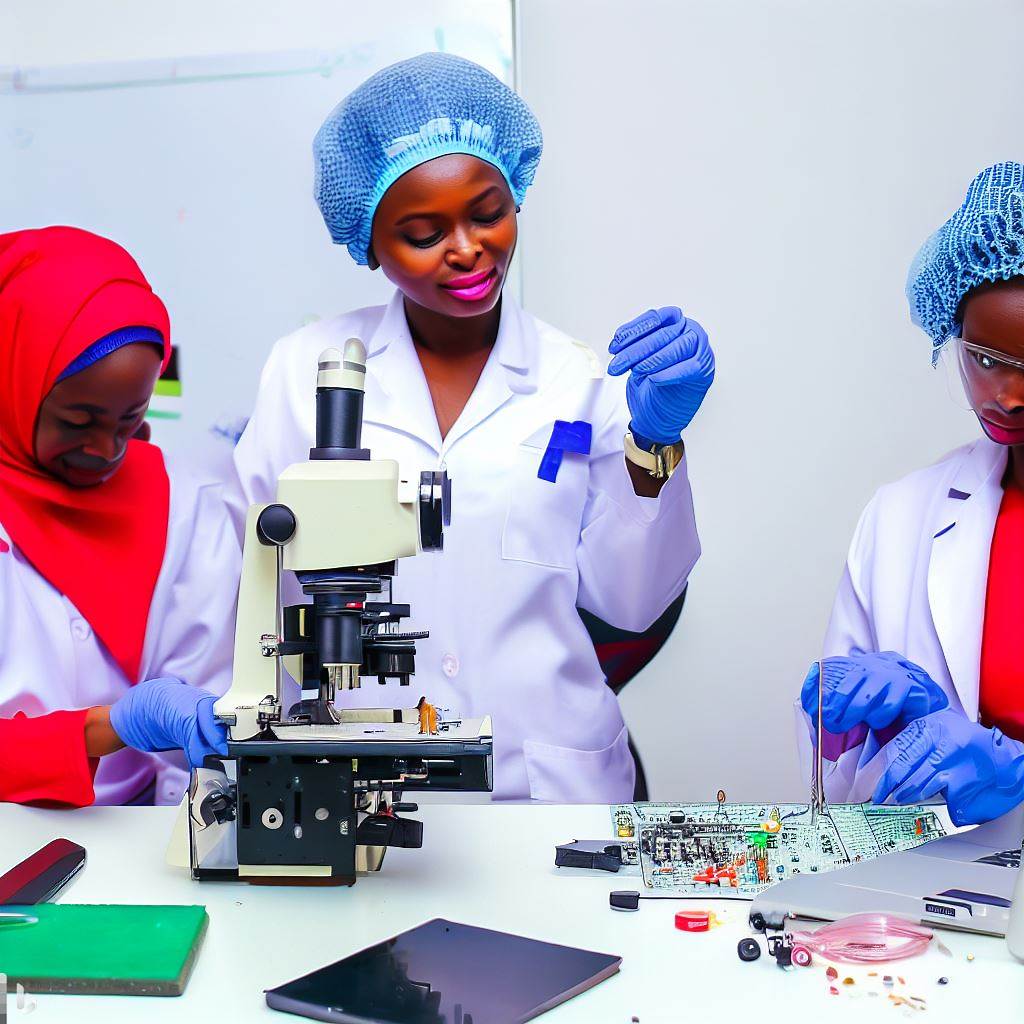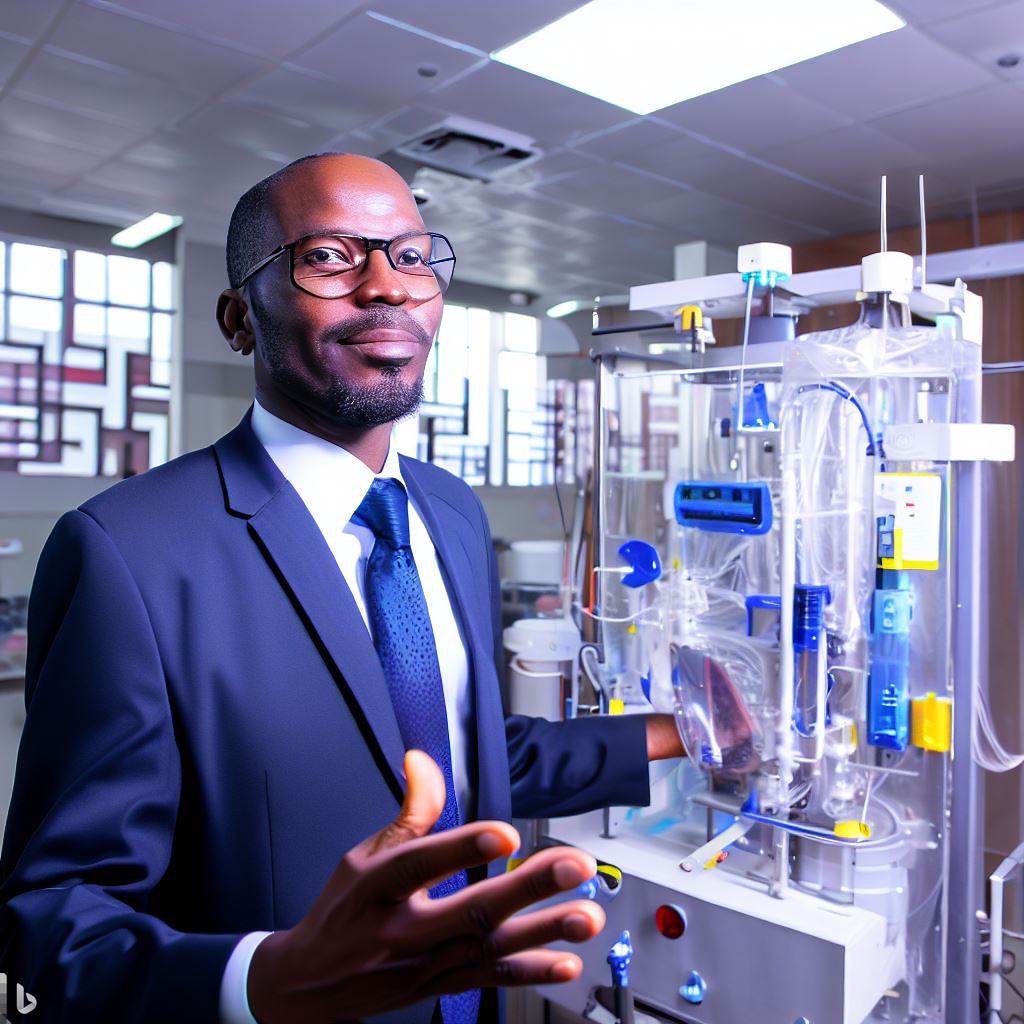Introduction
In Nigeria, the field of biomedical engineering stands as a pivotal force propelling healthcare progress and enhancing the overall quality of life.
This blog post delves into the vital role that biomedical engineering assumes in shaping a sustainable future for the nation.
Biomedical engineering is a catalyst for transformative healthcare breakthroughs in Nigeria.
Its multidisciplinary nature merges engineering principles with medical sciences, fostering innovations like advanced medical devices, diagnostics, and treatment methodologies.
These innovations hold the potential to revolutionize healthcare accessibility and effectiveness across the country.
This blog post underscores the profound importance of biomedical engineering in Nigeria’s journey towards sustainability.
By driving technological innovations and fostering homegrown expertise, biomedical engineering not only addresses current healthcare challenges but also establishes a foundation for a robust and self-reliant healthcare ecosystem.
In general, biomedical engineering emerges as a cornerstone for building a sustainable future in Nigeria.
Its contributions not only elevate healthcare standards but also position the nation on a trajectory of self-sufficiency and innovation.
Overview of the current state of biomedical engineering in Nigeria
Challenges faced by the sector
- Inadequate funding from the government and private sector.
- Limited research and development activities in biomedical engineering.
- Low awareness and understanding of the field among the general population.
- Insufficient regulations and policies to support the growth of biomedical engineering.
- Poor collaboration between academia, industry, and healthcare institutions.
Lack of infrastructure and resources
- Inadequate laboratory facilities for research and development purposes.
- Lack of modern equipment and technology needed for advanced biomedical engineering.
- Insufficient power supply, affecting the operation of medical devices and equipment.
- Limited access to necessary resources such as medical databases and scientific literature.
Shortage of skilled professionals
- Insufficient number of qualified biomedical engineers in the country.
- Brain drain, as skilled professionals often leave Nigeria for better opportunities abroad.
- Limited availability of specialized training programs in biomedical engineering.
- Lack of career prospects and attractive incentives to attract and retain talent in the sector.
Limited access to healthcare services
- Inadequate healthcare infrastructure, particularly in rural areas.
- Lack of medical facilities equipped with modern biomedical technology.
- Limited availability of affordable healthcare services for the general population.
- Unequal distribution of healthcare resources, leading to disparities in access to care.
The realm of biomedical engineering in Nigeria confronts multifaceted challenges.
Insufficient funding inhibits growth and research, while a lack of awareness and clear comprehension hampers progress.
Absence of proper regulations further curtails expansion and efficiency.
Inadequate infrastructure, including outdated equipment and unstable power supply, poses substantial barriers.
Scarce access to essential resources like medical databases and scientific literature stifles innovation.
Shortage of skilled biomedical engineers intensifies, exacerbated by brain drain and inadequate training opportunities.
Limited healthcare accessibility is concerning, particularly in rural areas. Uneven resource distribution compounds the issue.
To address this, increased funding, heightened awareness, and supportive regulations are crucial. Infrastructure improvement, resource availability, and enhanced training are pivotal for advancement.
Collaborative initiatives between academia, industry, and healthcare can drive innovation.
Expanding healthcare infrastructure and ensuring equitable access are paramount.
By surmounting these challenges, Nigeria can carve a sustainable path for biomedical engineering, fostering innovation and transforming healthcare delivery.
Role of biomedical engineering in building a sustainable future in Nigeria
Enhancing healthcare delivery
- Biomedical engineering plays a crucial role in improving healthcare services in Nigeria.
- It contributes to the development and implementation of advanced medical technologies.
- Biomedical engineers work to enhance the efficiency, accuracy, and safety of healthcare systems.
- They design and maintain medical equipment, ensuring its proper functioning to provide efficient patient care.
- By applying engineering principles to healthcare, they optimize processes, minimize errors, and improve overall healthcare delivery.
Development of medical devices and equipment
- Biomedical engineering is instrumental in the development and innovation of medical devices and equipment.
- Engineers collaborate with healthcare professionals to identify the needs and challenges in medical practice.
- They design, prototype, and manufacture medical devices that address specific healthcare issues.
- These devices include diagnostic tools, monitoring equipment, prosthetics, implants, and rehabilitation devices.
- By developing indigenous medical devices, Nigeria can reduce reliance on imported equipment, leading to self-sustainability.
Improving diagnostic and treatment methods
- Biomedical engineers contribute to improving diagnostic accuracy and treatment methods in Nigeria.
- They develop and implement advanced imaging technologies, such as MRI, CT scans, and ultrasound.
- These technologies help in the early detection and accurate diagnosis of diseases and conditions.
- Biomedical engineers also work on developing targeted drug delivery systems, ensuring precise treatment.
- By improving diagnostic and treatment methods, the overall healthcare outcomes in Nigeria can be significantly enhanced.
Promoting medical research and innovation
- Biomedical engineering promotes medical research and fosters innovation in Nigeria.
- Engineers collaborate with healthcare professionals and scientists to conduct research studies.
- They contribute to the development of new medical therapies, technologies, and treatment protocols.
- Biomedical engineers also work on improving existing medical practices through research and innovation.
- By promoting research and innovation, biomedical engineering contributes to the sustainable growth of the healthcare sector in Nigeria.
In fact, biomedical engineering plays a vital role in building a sustainable future in Nigeria’s healthcare system.
Through enhancing healthcare delivery, developing medical devices and equipment, improving diagnostic and treatment methods, and promoting medical research and innovation, biomedical engineers contribute to improving healthcare outcomes and self-sustainability.
Their expertise and efforts pave the way for a brighter future in healthcare in Nigeria.
Read: Postgraduate Studies: Biomedical Engineering in Nigeria

Initiatives and efforts for the growth of biomedical engineering in Nigeria
Collaboration between universities and industry
- Universities and industry players must work together to cultivate a strong biomedical engineering sector.
- Joint research projects can be conducted to address specific healthcare challenges in Nigeria.
- Collaborative efforts can lead to the development of innovative medical devices and technologies.
- Knowledge sharing between academia and industry can enhance the practical skills of biomedical engineers.
- Partnerships between universities and healthcare institutions can provide students with valuable clinical experience.
Government support and policies
- The government should allocate sufficient funding to support the growth and development of biomedical engineering.
- Policies should be put in place to encourage local manufacturing of medical devices and equipment.
- Tax incentives and grants can be offered to companies that invest in biomedical engineering research and development.
- Government initiatives can help bridge the gap between academia and industry by promoting collaboration.
- The establishment of regulatory bodies can ensure that biomedical engineering practices adhere to international standards.
Read: Universities Offering Robotics Engineering in Nigeria
International partnerships and funding
- International collaborations can provide access to advanced technologies, knowledge, and resources.
- Partnerships with foreign universities can facilitate exchange programs and research collaborations.
- Funding from international organizations can support research projects and infrastructure development.
- International conferences and workshops can provide networking opportunities for Nigerian biomedical engineers.
- Collaborations with foreign experts can enhance the skills and expertise of local engineers.
Professional development and training opportunities
- Continuing education programs should be provided to keep biomedical engineers updated with the latest advancements.
- Workshops and seminars can help enhance practical skills and knowledge in specialized areas.
- Professional associations can organize conferences and events to promote knowledge exchange and networking.
- Mentorship programs can be established to support early-career biomedical engineers.
- Opportunities for internships and industrial attachments can provide hands-on experience to students and graduates.
By implementing these initiatives and fostering a supportive environment, Nigeria can build a sustainable future for biomedical engineering.
Collaboration between universities and industry, government support and policies, international partnerships and funding, and professional development opportunities are key to unlocking the immense potential of this field in Nigeria.
Read: Career Paths for Biomedical Engineers in Nigeria
Success stories and case studies of biomedical engineering in Nigeria
Mobile Medical Clinics for Rural Nigeria: Introduction, goals, and impact
Biomedical engineering has made significant strides in Nigeria, leading to numerous success stories and impactful case studies.
One such project is Mobile Medical Clinics for Rural Nigeria, which aims to address the lack of access to healthcare facilities in remote areas.
The goal of Mobile Medical Clinics for Rural Nigeria is to design and develop mobile clinics equipped with advanced medical equipment, allowing medical professionals to reach underserved communities.
These clinics are built within modified buses, making them easily transportable and efficient in delivering healthcare services.
Since its implementation, Mobile Medical Clinics for Rural Nigeria has had a remarkable impact on the healthcare sector in Nigeria.
By bringing essential medical services directly to people’s doorsteps, it has improved healthcare access for thousands of individuals who previously had limited options.
In addition, Mobile Medical Clinics for Rural Nigeria has significantly reduced the burden on overcrowded hospitals by treating minor to moderate medical conditions and providing preventive care.
This has resulted in a more efficient use of hospital resources and improved overall healthcare delivery.
Maternal and Child Health: Introduction, goals, and impact
Another successful biomedical engineering project in Nigeria is Maternal and Child Health, an initiative aimed at improving maternal and child healthcare.
The primary focus of this project is to reduce maternal and infant mortality rates, which have been a persistent challenge in the country.
Maternal and Child Health employs advanced biomedical technologies to develop innovative solutions for monitoring pregnant women and infants, enabling early detection of potential health issues.
The project also focuses on educating healthcare providers and raising awareness among communities about the importance of regular check-ups and proper prenatal care.
The impact of Maternal and Child Health has been significant in Nigeria.
The use of advanced diagnostic tools and monitoring devices has led to early detection and timely intervention in high-risk pregnancies, saving many lives.
Additionally, the project’s educational initiatives have empowered communities to take charge of their own health and seek appropriate medical care.
As a result of Maternal and Child Health, Nigeria has witnessed a decline in maternal and infant mortality rates, bringing the country closer to achieving the Sustainable Development Goals set by the United Nations.
Prosthetics for a Better Future: Introduction, goals, and impact
Prosthetics for a Better Future is another notable success story in biomedical engineering in Nigeria, focusing on advancing prosthetics and assistive devices for individuals with disabilities.
The goal of this project is to improve the quality of life and mobility for those with physical impairments.
Through extensive research and development, Prosthetics for a Better Future has created cost-effective and technologically advanced prosthetics that are customized to fit the needs of each individual.
These prosthetics incorporate state-of-the-art materials and innovative designs, allowing users to regain their independence and participate fully in society.
The impact of Prosthetics for a Better Future is profound, bringing about positive changes in the lives of individuals with disabilities.
Access to affordable and functional prosthetics has enabled many people to engage in various activities, including education, employment, and sports.
This has not only improved their physical well-being but also helped break social barriers and reduce stigma.
Furthermore, Prosthetics for a Better Future has served as a catalyst for advancements in the field of biomedical engineering in Nigeria, encouraging further research and innovation in the development of assistive technologies.
These success stories and case studies highlight the significant contributions of biomedical engineering in Nigeria.
Projects like Mobile Medical Clinics for Rural Nigeria, Maternal and Child Health, and Prosthetics for a Better Future have revolutionized healthcare access, reduced mortality rates, and enhanced the quality of life for individuals with disabilities.
Through these remarkable initiatives, biomedical engineering is playing a crucial role in building a sustainable future for Nigeria.
Read: Working Conditions for Biomedical Engineers in Nigeria
Future prospects and potential of biomedical engineering in Nigeria
Addressing challenges and leveraging opportunities
- In order to ensure a sustainable future for biomedical engineering in Nigeria, it is crucial to address the challenges that currently exist.
- One major challenge is the lack of adequate healthcare infrastructure in the country, which hampers the growth of biomedical engineering.
- By investing in the development of healthcare facilities and technology, Nigeria can create a conducive environment for biomedical engineering to thrive.
- Furthermore, there is a need to strengthen the regulatory framework and ensure compliance with international standards to enhance the quality of biomedical engineering practices.
- By doing so, Nigeria can attract foreign investments and collaborations, which will further contribute to the growth and sustainability of the field.
- Nigeria must also leverage the opportunities that exist in the healthcare sector, such as the increasing demand for medical devices and technologies.
- With a growing population and rising awareness about healthcare, there is immense potential for biomedical engineering to make a significant impact in Nigeria.
- The government and relevant stakeholders should work towards creating a supportive ecosystem that encourages innovation and entrepreneurship in biomedical engineering.
Increasing investment in research and development
- Investing in research and development is crucial for the advancement of biomedical engineering in Nigeria.
- By allocating more funds towards research, the country can foster innovation and attract top talent in the field.
- Research institutions and universities should collaborate with industry experts to develop cutting-edge technologies and solutions.
- Government grants and incentives can encourage researchers to focus on areas that have significant potential for impact.
- With increased investment in research and development, Nigeria can position itself as a hub for biomedical engineering in Africa.
Strengthening education and training programs
- One key aspect of building a sustainable future for biomedical engineering in Nigeria is strengthening education and training programs.
- There is a need to develop comprehensive curriculum that covers both theoretical knowledge and practical skills required in the field.
- Collaborations with international universities and institutions can help in the exchange of knowledge and best practices.
- Internship programs and apprenticeships should be encouraged to provide hands-on training to students.
- By producing well-trained and skilled professionals, Nigeria can meet the demand for biomedical engineers in the country.
Collaborative efforts for sustainable growth
- Achieving sustainable growth in biomedical engineering requires collaborative efforts from various stakeholders.
- The government, healthcare institutions, research organizations, and industry players must work together towards a common goal.
- Partnerships between academia and industry can facilitate technology transfer and commercialization of innovative solutions.
- Knowledge sharing platforms, conferences, and workshops should be organized to promote collaboration and exchange of ideas.
- With a collaborative approach, Nigeria can build a strong biomedical engineering ecosystem that drives sustainable growth and development.
In essence, the future prospects and potential of biomedical engineering in Nigeria are promising.
By addressing challenges, increasing investment in research and development, strengthening education and training programs, and fostering collaborative efforts, Nigeria can build a sustainable future in biomedical engineering and contribute to the advancement of healthcare in the country.
Read: Diversity in Biomedical Engineering: Nigeria’s Perspective
See Related Content: Interviews with Successful Flight Engineers in Nigeria
Conclusion
Biomedical engineering plays a vital role in building a sustainable future in Nigeria’s healthcare sector.
The potential for growth and advancements in this field is significant.
However, to fully realize this potential, it is crucial for stakeholders to actively support and invest in the sector.
The government should provide funding and create policies that enable research and development.
Academic institutions should offer quality education and training programs to produce skilled professionals. Industry leaders should collaborate with researchers and support innovative projects.
It is only through such collaboration and support that Nigeria can maximize the benefits of biomedical engineering and improve healthcare outcomes for its citizens.
Together, we can build a sustainable future in healthcare for Nigeria.




